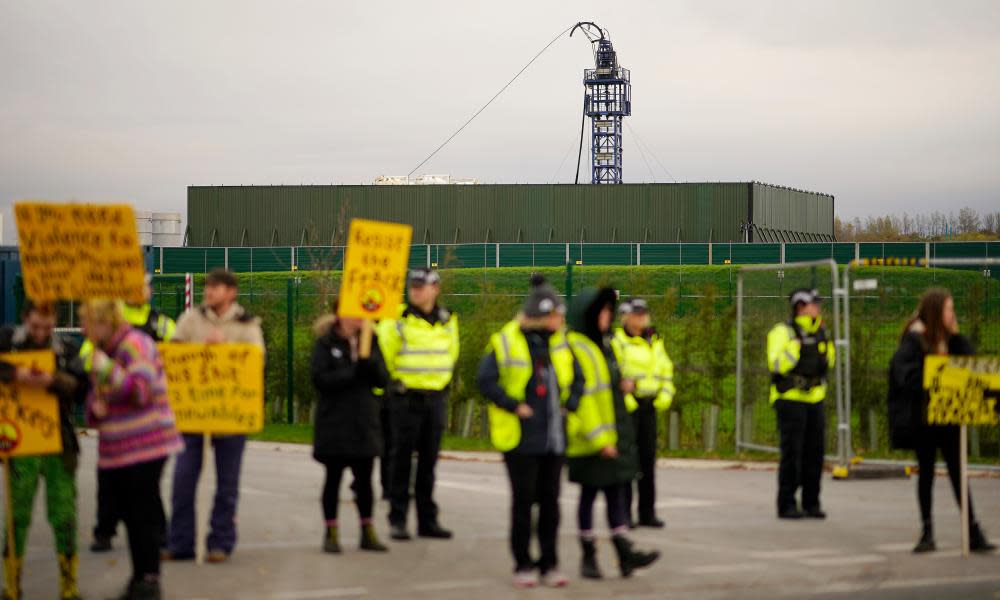Lancashire fracking has stopped since small earthquakes, say locals

The shale gas firm Cuadrilla has refused to confirm whether it has halted fracking after triggering a series of minor earthquakes near Blackpool, raising questions over the operation’s future prospects.
Dozens of small tremors have been registered near the company’s Preston New Road site, after it started pumping high volumes of water underground in October to explore for gas.
Several signs suggest the company has not undertaken any fracking in the past fortnight.
One indicator is the absence of low-level seismic activity, which the firm has said is to be expected from fracking operations. A total of 37 tremors have been recorded since fracking began on 15 October, but none since 4 November.
Locals have also said the company has told them no fracking took place last week.
Julie Brickles, a local borough councillor, said: “Cuadrilla did confirm at the community liaison group this Monday that they hadn’t fracked for a week. They said they’d looked into the seismic data. It was very positive and they would start fracking again within days.”
Campaigners who have kept up protests outside Preston New Road, in a farmer’s field halfway between Blackpool and Preston, said the site has resembled a “ghost town” for the past two weeks.
They say there has been no sound of the five pumps used by Schlumberger, the oil services firm carrying out the fracking for Cuadrilla, which were heard in October.
The company would not confirm whether it was fracking, saying only it was continuing to test the well.
“We have been fracturing along the full length of the horizontal well using smaller volumes of water to test the micro-seismic response of the rock,” a spokesperson said.
Fracking is usually understood to involve high volumes of water to fracture shale rock and release gas trapped inside.
Cuadrilla has told regulators each of the 45 “stages” of the well it is fracking will use up to 765 cubic metres of water – the equivalent of five homes’ average annual water use.
Fracking, or hydraulic fracturing, is a way of extracting natural gas from shale rock formations that are often deep underground. It involves pumping water, chemicals and usually sand underground at high pressure to fracture shale – hence the name – and release the gas trapped within to be collected back at the surface.
The technology has transformed the US energy landscape in the last decade, owing to the combination of high-volume fracking – 1.5m gallons of water per well, on average – and the relatively modern ability to drill horizontally into shale after a vertical well has been drilled.
Francis Egan, Cuadrilla’s chief executive, previously told the Guardian that because of concerns over seismicity the company planned to frack about one stage a day. He said that would take around two and a half months, as the company was only able to frack during the day between Monday and Friday and only in the morning on Saturdays.
A fortnight’s hiatus would call that schedule into doubt and raises questions about the costs being incurred by the company, which has said each day of inactivity on the site costs it £94,000.
It is not clear why Cuadrilla would have stopped fracking or when it could restart. Opponents have speculated it could be to avoid negative headlines prompted by the flurry of minor earthquakes, and the subsequent hit to the share price of the Australian firm AJ Lucas, which holds a 47.4% stake in Cuadrilla.
Rose Dickinson, a campaigner at Friends of the Earth, said: “This isn’t the fracking fanfare Cuadrilla were hoping for. Instead, the industry seems to be stuttering into insignificance.”
The firm has called on the government to relax its “traffic light system” regulations that require companies to stop operations if a 0-5-magnitude tremor is registered. However, ministers have rejected that idea.
Natascha Engel, the government’s shale gas commissioner, wrote to the media this week to criticise “alarming” coverage of the minor earthquakes near Blackpool.
“By reporting fracking events that cause tremors of 1.1 as earthquakes but not reporting similar or greater events in other industries, the media is in danger of reinforcing a narrative of fear around fracking,” the former Labour MP said.

 Yahoo News
Yahoo News 
